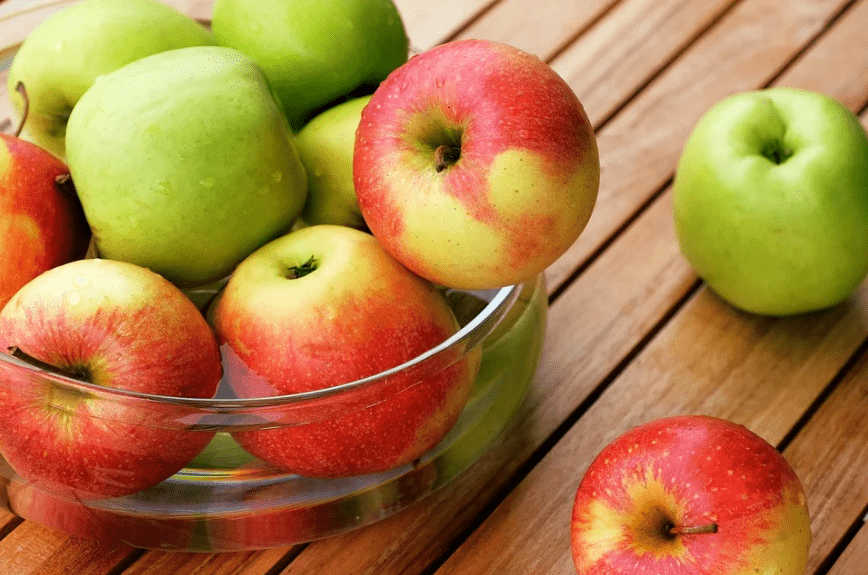Whenever you ask a child, “A is for?” perhaps, even before he answers, you already know that he would say “apple!” Apple is the most popular fruit worldwide, and for good reasons. It’s also the fruit considered the healthiest as it is associated with keeping you away from sickness and from visiting the doctor for check-ups.
An old English proverb, “An apple a day keeps the doctor away,” was coined in 1913. Although some literally take it, but there’s nothing wrong with it. However, the proverb originally appeared in 1866 on the Notes and Queries magazine, which published the first-known example of the proverb that says, “Eat an apple on going to bed, and you’ll keep the doctor from earning his bread.” It basically meant that consuming nutritious food would make you healthier and free you from going to the doctor very often.
By the 20th century, different versions of the rhyme circulated around England, including the now popular “an apple a day keeps the doctor away.” During those times, the English used the word “apple” to mean any round fruit from a tree, which they believed promoted greater health benefits. But is there any truth to it?
Yes, there is. Eating nutritious food, including fruits like apples, helps keep you healthy. Apple is one fruit that is jam-packed with vitamins and nutrients. In addition, there’s no guilt in eating many apples because this fruit is low in calories and sodium and does not contain and cholesterol.
How nutritious are apples?
When you eat a medium-sized apple, about 3 inches in diameter (7.6 centimeters), it’s as if you have also eaten 1.5 cups of fruit. On a 2,000-calorie diet, you need two cups of fruit daily.
A medium apple that weighs 6.4 ounces or 182 grams offers the following nutrients:
(Reference Daily Intake/RDI)
- Calories: 95
- Carbs: 25 grams
- Fiber: 4 grams
- Vitamin C: 14% of the RDI
- Potassium: 6% of the RDI
- Vitamin K: 5% of the RDI
The same amount of serving can also give 2–4% of the RDI for manganese, copper, and the vitamins A, E, B1, B2, and B6.
Good for the Heart
Apples have soluble fiber, which helps lower blood cholesterol levels and has been linked to a lower risk of heart disease. Apples also contain polyphenols, especially in their skin. For example, flavonoid epicatechin is a polyphenol that can lower blood pressure, especially with higher intake.
Flavonoids lower blood pressure reduces “bad” LDL oxidation and acts as antioxidants, thus prevent heart disease.
Helps you Lose Weight
Have you tried eating apples and feel so full and don’t want to eat your meals? It’s because apples are high in fiber and water, which make them filling. This is supported by a study that stated that people who eat slices of apple before a meal felt fuller than those who don’t consume apples or products like applesauce, apple juice.
A 10-week study was conducted among 50 overweight women. It revealed that women who ate regularly ate apples lost an average of 2 pounds (1 kg) and ate fewer calories overall than those who ate oat cookies containing similar calorie and fiber content.
Prebiotic Effects and Promote Good Gut Bacteria
Apples have pectin, a type of fiber that acts as a prebiotic that feeds the good bacteria in the gut. During digestion, the small intestine doesn’t absorb fiber. Instead, the fiber will go to your colon, which may cause the growth of good bacteria.
Substances in Apples May Help Prevent Cancer
Studies reveal a link between the fruit’s plant compounds and a lower risk of cancer. Another study among women found out that those who regularly eat apples had chances of deaths caused by cancer. It is associated with its antioxidant and anti-inflammatory properties that are responsible for their potential cancer-preventive effects.
Linked to a Lower Risk of Diabetes
If you fear acquiring type 2 diabetes, apples must be included in your daily diet because studies tell there is a link between the lower risk of having type 2 diabetes and eating apples.
A study found out that there is about 28% lower risk of type 2 diabetes to those who eat an apple a day or even just a few apples per week had a similarly protective effect.
Polyphenols in apples are believed to be responsible for preventing tissue damage to beta cells in the pancreas. Insulin is produced by Beta cells and is often damaged in people with type 2 diabetes.
Apples May Be Good for Bone Health
Bone health is vital in our movement and in performing our daily tasks. Fruits are also beneficial to the overall health of our bones, especially bone density.
A study reveals that women who ate a meal that included fresh apples, peeled apples, and applesauce lost less calcium from their bodies than those who don’t. Researchers, therefore, believed the apple’s antioxidant and anti-inflammatory compounds have helped promote bone density and strength.


